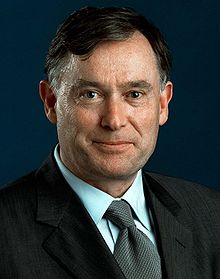Horst Koehler
| Horst Köhler | |
|---|---|
 |
|
| President of Germany | |
|
In office 1 July 2004 – 31 May 2010 |
|
| Chancellor |
Gerhard Schröder Angela Merkel |
| Preceded by | Johannes Rau |
| Succeeded by | Christian Wulff |
| Managing Director of the International Monetary Fund |
|
|
In office 1 May 2000 – 4 March 2004 |
|
| Preceded by | Michel Camdessus |
| Succeeded by | Rodrigo Rato |
| Personal details | |
| Born |
22 February 1943 Heidenstein, General Government (now Skierbieszów, Poland) |
| Political party | Christian Democratic Union |
| Spouse(s) | Eva Bohnet |
| Children | 2 |
| Alma mater | University of Tübingen |
| Profession | Economist |
| Signature | |
| Website | http://www.horstkoehler.de/en/ |
Horst Köhler (German: [ˈhɔɐ̯st ˈkøːlɐ] (![]() listen); born 22 February 1943) is a German politician of the Christian Democratic Union, and served as President of Germany from 2004 to 2010. As the candidate of the two Christian Democratic sister parties, the CDU and the CSU, and the liberal FDP, Köhler was elected to his first five-year term by the Federal Assembly on 23 May 2004 and was subsequently inaugurated on 1 July 2004. He was reelected to a second term on 23 May 2009. Just a year later, on 31 May 2010, he resigned from his office in a controversy over his comment on the role of the German Bundeswehr in light of a visit to the troops in Afghanistan. During his tenure as German President, whose office is mostly concerned with ceremonial matters, Köhler was a highly popular politician, with approval rates above those of both chancellor Schröder and later chancellor Merkel.
listen); born 22 February 1943) is a German politician of the Christian Democratic Union, and served as President of Germany from 2004 to 2010. As the candidate of the two Christian Democratic sister parties, the CDU and the CSU, and the liberal FDP, Köhler was elected to his first five-year term by the Federal Assembly on 23 May 2004 and was subsequently inaugurated on 1 July 2004. He was reelected to a second term on 23 May 2009. Just a year later, on 31 May 2010, he resigned from his office in a controversy over his comment on the role of the German Bundeswehr in light of a visit to the troops in Afghanistan. During his tenure as German President, whose office is mostly concerned with ceremonial matters, Köhler was a highly popular politician, with approval rates above those of both chancellor Schröder and later chancellor Merkel.
Köhler is an economist by profession. Prior to his election as President, Köhler had a distinguished career in politics and the civil service and as a banking executive. He was President of the European Bank for Reconstruction and Development from 1998 to 2000 and head of the International Monetary Fund (IMF) from 2000 to 2004. From 2012 to 2013, Köhler served on the UN Secretary General's High-level Panel on the Post-2015 Development Agenda.
...
Wikipedia
